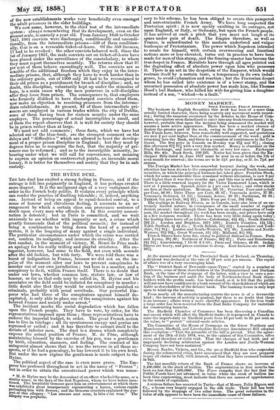MONEY MARKET.
STOCK EXCHANGE, FEEDS", AFTERNOON.
The business in English Securities this week has been of a more than usually limited character, there being scarcely any movement worth record- ing; during the suspense occasioned by the debates in the House of Com- mons, speculators seem disinclined to enter into any fresh transactions ; it is, however, probable that upon the decision being announced the market will assume a more active appearance. There has been a marked absence of dealers the greater part of the week, owing to the attractions of Epsom. The Funds have, however, been remarkably well supported, and quotations are now per cent higher than at the commencement of the week ; gold is returning into the Bank, and there is a cessation of remittances to the Con- tinent. The first price in Consols on Monday was 978 and 97j; closhag this afternoon 971 971 with a very firm market. Money is abundant on the Stock Exchange, and loans are obtainable at very low rates. Exchequer Bills, 408. 458. Bank Stock, 220 223. Notice has been given that the Ex- chequer Bills dated in June 1857 must be sent in on or before the 7th of next month for renewal ; the terms are to be lid. per day, or 2/. 58. 70. per annum.
The Foreign Market has been somewhat buoyant during the week, and attention has been drawn to the comparatively low prices of South American securities, in which the principal business has taken place. Peruvian Stock, which for some considerable time remained without alteration, is now 8 per cent higher than it was three months ago ; and this rise is well maintained. There is a little renewed inquiry for the Victor Emmanuel Loan, which is now at 1 premium. Spanish Active is per cent better ; and other stocks are firm at their quotations. Mexican, 201 21; Peruvian Four-and-a-half per Cent, 86 88; Ditto Three per Cent, 66 67; Venezuela Active, 37 38; Venezuela Deferred, 15 151 ; Grenada Active, 20 21; Sardinian, 92 93; Turkish Six per Cent, 961 971 ; Ditto Four per Cent, 1041041. The dealings in Railway. Shares, as in Consols, have also been of an ex- tremely limited nature, in consequence of the small number of regular dealers present ; but although there has been an almost stagnation of busi- ness, the market throughout the week has been steady, and prices have only in a few instances receded. There has been very little doing again today ; the leading lines leave off as follows—Caledonian, 421 421 ; South-Eastern, 201 21; London and Brighton, 107i 1081 ; Eastern Counties, 12j12; North Stafford, 4141 dis. ; North British, 511 518 ; Lancashire and York- shire, 918 911 ; London and South-Western, 471 48; London and North- Western, 938 93/ ; Great Western, 551 5.5k; Midland, 931 931.
French Shares have been flat, owing to political distrust in France. Paris and Lyons, 29i 30; Northern of France, 361 371 ; Paris and Strasbourg, 241 241; Luxembourg, 7 15-16 8 1-16; Paris and Orleans, 48 50. Indian Shares are heavy, and prices continue to droop. East Indians are now 1061 1071.
At the annual meeting of the Provincial Bank of Ireland, on Thursday, a dividend was declared at the rate of 10 per cent per annum. The report of affairs was of a very encouraging kind.
The "District Bank of Neweastle-upon-Tyne," started by a number of gentlemen some of them shareholders of the Northumberland and Durham Bank, at le time of the stoppage of the latter, with a view to save a por- tion of the business and assist the body of Northumberland Bank share- holders with the profits made, has been closed, as it is felt that the public will not now have confidence in a bank several of the shareholders of which are liable as shareholders of the defunct bank. The banking-house is only kept open to wind-up the business.
From nearly all the manufacturing centres the news is of a favourable kind ; the increase of activity is gradual, but there is no doubt that there is an increase ; affairs wear a more cheerful appearance. In the iron trade a large order has been received from the East India Company for materials for constructing barracks.
The Sheffield Chamber of Commerce has been discussing a Canadian movement which will affect the Sheffield trade—it is proposed in Canada to raise the import-duty on Sheffield goods from 15 per cent to 25 per cent on the value, to "protect" colonial-made articles.
The Committee of the House of Commons on the Great Northern and Manchester, Sheffield, and Lincolnshire Railways Amendment Bill adopted this resolution—" That the preamble of the bill is proved. That the agree- ment of the 29th of July 1854, was, in the opinion of this Committee, ultra firer, and therefore ab snitio void. That the charges of bad faith and of improperly declining arbitration against the London and North-Western Company have not been sustained.'
Messrs. Naylor, Vickers, and Co., the great Sheffield firm who suspended during the commercial crisis, have announced that they are now prepared to pay all claims in full, with interest, and that they have resumed business in full.
The last monthly return of the Bank of France shows an increase of 2,400,000/. in the stock of bullion. The augmentation in four months has been no less than 7,600,0001. The Times remarks that the fact that the Public Funds have not advanced in value while the stock of bullion has been thus augmenting, must indicate that there are causes of apprehension in the minds of capitalists.
A serious failure has occurred in Turin—that of Messrs. Felix Rignon and Co., a house very largely engaged in the silk trade. Their fall has been followed by the stoppage of two other firms. The great reduction in the value of silk appears to have been the immediate cause of these failures.


























 Previous page
Previous page